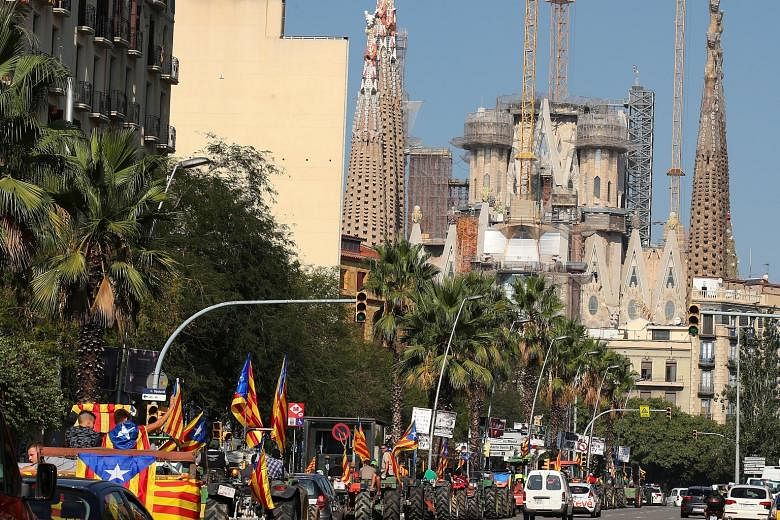BARCELONA • Catalonia's campaign for independence comes to a head tomorrow when the rebel administration in Barcelona will attempt to hold a referendum in defiance of Spain's Constitutional Court and Prime Minister Mariano Rajoy's government in Madrid.
Investors so far have shrugged off what is the gravest constitutional crisis to befall Spain since it returned to democracy after the death of dictator Francisco Franco four decades ago.
Spain's benchmark Ibex 35 index has outperformed its peers this year, while the extra yield that investors demand to hold Spanish bonds instead of German debt is not much changed from September last year.
But it may be time that investors started paying more attention, said Ms Angel Talavera at Oxford Economics in London.
While Spain will not recognise the results of the referendum, the push for statehood could eventually hurt the economy, discourage investment and raise questions about Mr Rajoy's ability to govern.
Why should investors care about Catalonia? First, Catalonia is big and so is Spain's debt. The 7.5 million Catalans make up 16 per cent of Spain's population and account for 20 per cent of output, making it the biggest regional economy.
Revenue generated by the region helps Madrid make payments on its €1.1 trillion (S$1.8 trillion) of debt and Catalan separatists have floated the prospect of withholding tax revenue from the Spanish treasury.
Second, Mr Rajoy relies on regional allies, including deputies from the Basque PNV party, to help his minority government pass legislation, and they do not like what they are seeing in Catalonia.
Third, despite the Bank of Spain reaffirming its estimate of 3.1 per cent economic growth for the country this year, its chief economist has warned that tensions in Catalonia could sap confidence.
As Europe comes to terms with Britain's divorce from the European Union, the bid by Catalonia to exit Spain raises the prospect of more fissures on the continent. Mr Rajoy's government has made clear that a hypothetical Catalan republic would have to be outside both the euro zone and the EU. At the very least, the Catalan issue could become a distraction as leaders try to sketch out a vision to reshape the bloc.
Yet Catalonia is pressing ahead with the vote even after the Madrid government seized 10 million ballots, deployed thousands of police, arrested more than a dozen local officials and took over the region's finances.
Referendum organisers say they have stashed ballot boxes in secret locations throughout the coastal region as police raid government buildings and local businesses looking to seize anything related to the vote.
A Catalan court also ordered police, including the region's own force, to keep all public buildings closed tomorrow so they cannot be used as polling stations.
But the Catalan National Assembly, a pro-independence group with 40,000 members, has spent years working out how to quickly alert and mobilise voters to the thousands of improvised polling stations they plan to roll out.
Catalan President Carles Puigdemont this week said a unilateral declaration of independence is not on the table and his priority is to ensure the vote takes place.
However, his head of international affairs, Mr Raul Romeva, told reporters in Brussels on Thursday that Catalonia would declare independence within 48 hours of the final count, La Vanguardia newspaper reported.
Catalonia held what it called a non-binding ballot on independence three years ago that was backed by about 80 per cent of voters, but less than a third of those eligible turned out.
BLOOMBERG

